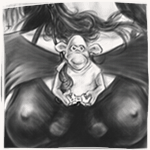When life is a competition, we all lose (theguardian.com).

“It is the age-long truism that works of art cannot compete. Each time the Booker or the Turner prize comes round, someone makes the point that the appraisal of art is subjective and thus the selection of the ‘best’ book or best painting or best dishevelled bedroom as ‘the winner’ is an exercise in futility. Most of us agree in principle, and yet winners emerge because winners must emerge. Our desire for exceptionalism will not allow more than one person on the podium.
“There is an increasing appetite for winner-takes-all prizes in the arts. The media mostly ignore more collaborative awards that share prize money with many winners, such as the various grants given by the Society of Authors. This is not to needlessly berate the prize-giving industry. No matter the prize structure, all financial support for the arts is appreciated (especially in such austere times), but these zero-sum accolades could be detrimental to creative life. For in the creative landscape there can be no real losers because each work is uniquely successful; and there can be no real winners, for each work is distinctively flawed.”
But does patronage demand, and indeed depend upon it? Dr. Samuel Johnson, author, essayist, critic and writer of the pre-eminent Georgian era Dictionary of the English Language, defined a patron (although not in his dictionary) as:
“One who looks with unconcern on a man struggling for life in the water, and, when he has reached ground, encumbers him with help.”
Perhaps ungrateful, but it is telling how many wish to commission, and indeed even offer to manage an artists’ work once he or she is “known” and getting attention and how quickly they leave, often caring little for anything produced, once they are not. For sure, you can spot the parallels in music and pop culture there too.
Recent/related stories
- Research suggests not paying artists is deeply entrenched in gallery culture (Pick of the Week 28th May 2014)


